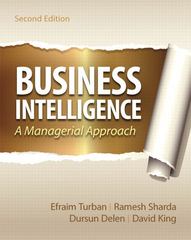Question
Not looking for a summary but your personal take away from the article what is your personally taking from the article and how are you
Not looking for a summary but your personal take away from the article
what is your personally taking from the article and how are you interpreting the author's message. Looking for answer in your personal opinion. In on wrds, no plagrsm-research only
'What Makes A Leader' by Daniel Goleman: Summary
Updated:Mar 9, 2021
Emotional Intelligence?? Huh? The notion of emotional intelligence is still, for many people, quite mysterious. It is not usually taught at Universities unless you are a psychology student or study a related degree. It is not a common topic that gets much attention in broad media; thus, it seems to be a niche area... yet so important amid challenging times and changing business landscape that we all face today due to the pandemic's impact.
Every person has a certain degree of emotional intelligence (EQ); we may not be fully aware of when and how we use it. EQ helps us to build stronger relationships, succeed professionally and academically or achieve our personal goals.
Daniel Goleman, one of the most distinguished writers in EQ, originally published the article for the Harvard Business Review (HBR) back in June 1996 called "What Makes a Leader." Over the years, the same article was chosen to be published in 'HBR's 10 Must Reads on Emotional Intelligence'. The HBR's 10 Must Reads series is the definitive collection of ideas and best practices for aspiring and experienced leaders alike. These books offer essential reading selected from the pages of HBR on topics critical to every manager's success.
In his masterpiece, Daniel Goleman suggests that emotional intelligence is equally important to a company's success, like cognitive skills or the level of intelligence (IQ). He identifies five key elements of emotional intelligence:
Self-awareness is the ability to recognise and understand your moods, emotions, and drives, as well as their effect on others. Distinctive characteristics of self-awareness are self-confidence, realistic self-assessment, self-deprecating sense of humour. Individuals who have a high degree of self-awareness recognise very well how their feelings affect them, other people, and their job performance. They do not overly criticize other people but also show an excellent level of integrity and honesty. They do not tend to be overly optimistic or hopeful with others but rather honest.
Self-regulation is the ability to control or redirect disruptive impulses and moods. People with a high level of self-regulation skills are more likely to make better decisions under pressure and manage their feedback towards subordinates effectively. They can channel their bad emotions into doing something productive. Key hallmarks of self-regulations are trustworthiness, integrity, comfort with ambiguity, or openness to change. Normally, our emotions are driven by biological impulses caused by stress, anger or excitement, etc. However, people with well-developed self-regulation skills can respond to those biological impulses with a distance and manage them well.
Motivation is a passion for working for reasons beyond money or statusa propensity to pursue goals with energy and persistence. Key hallmarks include a strong drive to achieve success, optimism, or organisational commitment. All outstanding leaders are driven to achieve results beyond expectations- their own and everyone else's. It is normal to feel motivated at work due to high salaries or status, but true leaders will have a pure desire to succeed just for achievement.
Empathy is the ability to understand other people's emotional makeup, a skill in treating people according to their emotional reactions. Key hallmarks are expertise in training and retaining talent, cross-cultural sensitivity, or service to clients. Empathy is a key skill in mentoring and coaching. Excellent mentors can get inside their mentees' heads and find a way to provide feedback that is extremely effective and well-perceived by others.
Social skill is proficiency in managing relationships and building networks and an ability to find common ground and build rapport. Distinctive characteristics include effectiveness in leading change, persuasiveness, expertise in building and leading teams. Social skill is the culmination of the other dimensions of EQ. People tend to be very effective at managing relationships when they can understand and control their own emotions and empathize with others' feelings.
Emotional intelligence can be trained and improved over time. A process is not easy as a part of our brain largely controls it; thus, it requires much training and a decent level of self-reflection and commitment to understanding much-needed changes. Brain cells, just like muscles, must be trained to improve their functions. The art of emotional intelligence and its importance on business performance has been hugely undervalued. There was a belief that successful executives must have a great intelligence level, possess the capabilities to think outside the box, promote innovation and research processes to increase the organisation's competitiveness. Although all these elements are so important in managing a company, Daniel Goleman's research proves that emotional intelligence is essential in leading teams and large organisations, and those people with a high level of EQ are more likely to be successful in business management. We are all born with certain skills and levels of EQ, but we can strengthen these abilities through persistence, practice, and feedback from colleagues and coaches.
Step by Step Solution
There are 3 Steps involved in it
Step: 1

Get Instant Access to Expert-Tailored Solutions
See step-by-step solutions with expert insights and AI powered tools for academic success
Step: 2

Step: 3

Ace Your Homework with AI
Get the answers you need in no time with our AI-driven, step-by-step assistance
Get Started


